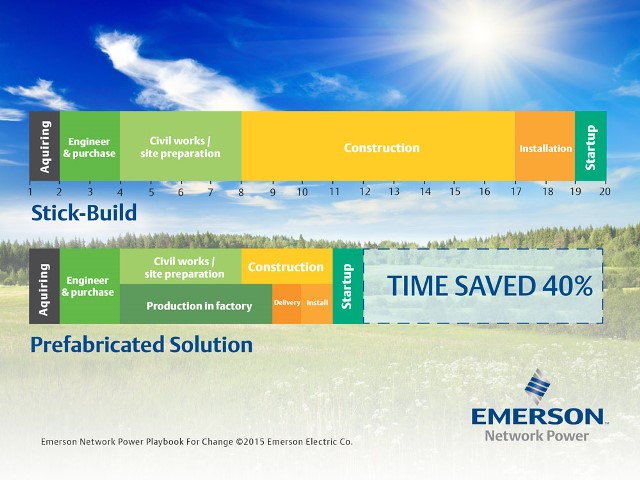Emerson Network Power, a business of Emerson and a global leader in maximizing availability, capacity and efficiency of critical infrastructure, explores the options for prefabricated data centers in an executive brief and playbook released today. The pieces delve into the emerging approach to data center deployment and are designed to help IT and telecom leaders better understand the landscape when considering new data center investments.
Prefabricated data centers transform traditional data center construction practices by manufacturing and testing an entire facility offsite in modules before shipping and assembling those modules onsite. The result is a state-of-the-art, tightly integrated facility that can be deployed faster and at a lower cost than a similar facility using traditional construction practices.
“Prefabricated data centers are emerging as a new and viable solution for the changing capacity demands of the data center. As opposed to the traditional ‘brick-and-mortar’ data center, these prefabricated data centers are scalable and rapidly deployable, promising significant savings on building cost and deployment,” said Steve Shelley, vice president of modular solutions, Emerson Network Power in Asia. “Moreover, modularity enables ‘grow as you grow,’ allowing data center solutions to be sized accordingly to meet client demands. Prefabricated data centers are ideal for a wide range of industries such as telecom, industrial, and healthcare.”
The business case for prefabricated data centers is explained in the Executive Brief, “Prefabricated Data Centers: Are They Right for You?” In the Playbook for Change, “Evaluating and Deploying Prefabricated Data Centers,” Emerson Network Power takes a closer look at executional considerations. Some potential advantages to the approach, examined more closely in the two pieces, include:
- Speed of Deployment: Prefabricated data centers cut months off the time to deploy and should appeal to any organization seeking to accelerate data center deployment.
- Scalability: Because prefabricated data centers take a modular approach to design and fabrication, they are inherently scalable, allowing streamlined, on-demand capacity expansion.
- Cost Control: Prefabricated data centers leverage economies of scale and streamlined processes made possible by offsite assembly to enable lower total cost of ownership.
- Design Flexibility: Prefabricated data centers are custom designed to a site and have no inherent limitations in terms of functionality or aesthetics.
- Performance: Assembly in a factory-controlled environment enables more control over fit, finish, and quality of workmanship, plus thorough testing and optimization prior to delivery.
- Intelligence: Integrated components, managed together, enable higher IT productivity and more dynamic capacity adjustments
- Project Management and Service: Preassembled, integrated systems—featuring components from a single vendor or chosen for their compatibility—simplify project specification and execution and ensure more efficient service and maintenance over the life of the deployment.
“Telecom services, such as voice and data, require high performance systems to handle increasing customer demand. Prefabricated data centers are an attractive solution for telecom operators, providing cost and energy efficiency. As they are rapidly deployable, prefabricated data centers make growth easier, and anticipation of the need for expansion means the infrastructure can grow without the site skipping a beat, as these data centers can be installed while those already working remain in operation,” said Cal Lahteenmaa, technical director, telecoms, Emerson Network Power in Asia.












